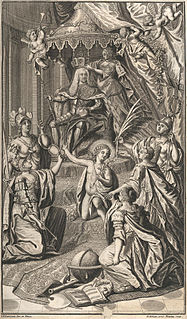Aftermath
Joseph acceded to the throne on his father's death on May 5, 1705.
The imperial election of 1690 was an imperial election held to select the emperor of the Holy Roman Empire. It took place in Augsburg on January 23.
On May 26, 1685, Charles II, Elector Palatine, the Calvinist elector of the Electoral Palatinate, died without children. He was succeeded by his Catholic cousin Philip William, Elector Palatine, bringing the balance of electors to six Catholics, one Calvinist, and one Lutheran.
The Holy Roman Empire had been embroiled since 1683 in the Great Turkish War, repelling attempted Ottoman conquests in Southeast Europe. On September 25, 1688, hoping to capitalize on the empire's preoccupation with the Turks, the French king Louis XIV of France invaded across the Rhine, precipitating the Nine Years' War. Louis's war aims were to install his preferred candidate, Wilhelm Egon von Fürstenberg, bishop of Strasbourg, as elector of Cologne, and to occupy the Electoral Palatinate, to which he believed he was entitled as Charles II's sister Elizabeth Charlotte, Madame Palatine was the wife of his younger brother Philippe I, Duke of Orléans.
Leopold I, Holy Roman Emperor called for the election of his successor. He was granted one vote as king of Bohemia, but because the even number of electors might result in a tie, following the precedent of the elections of 1653 and 1658, he abstained. The remaining seven electors were:
Joseph I, Holy Roman Emperor, Leopold's eldest son, was elected.
Joseph acceded to the throne on his father's death on May 5, 1705.

The prince-electors, or electors for short, were the members of the electoral college that elected the emperor of the Holy Roman Empire.

The Electoral Palatinate or the Palatinate, officially the Electorate of the Palatinate, was a state that was part of the Holy Roman Empire. Counts palatine of the Rhine served as prince-electors from "time immemorial," were noted as such in a papal letter of 1261, and were confirmed as electors by the Golden Bull of 1356.

The House of Wittelsbach is a German dynasty, with branches that have ruled over territories including Bavaria, the Palatinate, Holland and Zeeland, Sweden, Hungary, Bohemia, the Electorate of Cologne and other prince-bishoprics, and Greece. Their ancestral lands of the Palatinate and Bavaria were Prince-electorates, and the family had three of its members elected emperors and kings of the Holy Roman Empire. They ruled over the Kingdom of Bavaria which was created in 1805 and continued to exist until 1918.

Frederick V was the Elector Palatine of the Rhine in the Holy Roman Empire from 1610 to 1623, and reigned as King of Bohemia from 1619 to 1620. He was forced to abdicate both roles, and the brevity of his reign in Bohemia earned him the derisive sobriquet "the Winter King".

The Electorate of Bavaria was an independent hereditary electorate of the Holy Roman Empire from 1623 to 1806, when it was succeeded by the Kingdom of Bavaria.
The imperial election of 1376 was an imperial election held to select the emperor of the Holy Roman Empire. It took place in Frankfurt on 10 June.
The imperial election of 1438 was an imperial election held to select the emperor of the Holy Roman Empire. It took place in Frankfurt on March 18.
The imperial election of 1440 was an imperial election held to select the emperor of the Holy Roman Empire. It took place in Frankfurt on February 2.
The imperial election of 1531 was an imperial election held to select the emperor of the Holy Roman Empire. It took place in Cologne on January 5.
The imperial election of 1562 was an imperial election held to select the emperor of the Holy Roman Empire. It took place in Regensburg on November 28.

The imperial election of 1612 was an imperial election held to select the emperor of the Holy Roman Empire. It took place in Frankfurt on June 13.
The imperial election of 1619 was an imperial election held to select the emperor of the Holy Roman Empire. It took place in Frankfurt on August 28.
The imperial election of 1636 was an imperial election held to select the emperor of the Holy Roman Empire. It took place in Regensburg on December 22.
The imperial election of 1653 was an imperial election held to select the emperor of the Holy Roman Empire. It took place in Augsburg on May 31.
The imperial election of 1658 was an imperial election held to select the emperor of the Holy Roman Empire. It took place in Frankfurt on July 18.
The imperial election of 1711 was an imperial election held to select the emperor of the Holy Roman Empire. It took place on October 12.

The imperial election of 1742 was an imperial election held to select the emperor of the Holy Roman Empire. It took place in Frankfurt on January 24. The result was the election of Charles Albert of Bavaria, the first non-Habsburg emperor in hundreds of years.
The imperial election of 1764 was an imperial election held to select the emperor of the Holy Roman Empire. It took place in Frankfurt on March 27.
The imperial election of 1790 was an imperial election held to select the emperor of the Holy Roman Empire. It took place in Frankfurt on September 30.

The Imperial election of 1257 was two imperial elections in the Holy Roman Empire held to select the emperor.